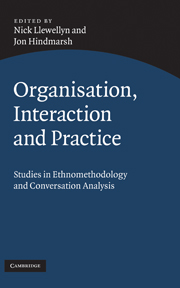1 - Work and organisation in real time: an introduction
Published online by Cambridge University Press: 20 May 2010
Summary
No social institution can be treated as a self-subsistent entity which exists independently of the accounting practices of its participants. The reproduction of institutional settings and the accounting practices through which they are constituted is an elementary and fundamental fact of institutional life. And to demand that institutions function in independence from these reproductive processes is, to adapt an earlier observation of Garfinkel's, … ‘very much like complaining that if the walls of a building were only gotten out of the way one could see better what was keeping the roof up’.
(Heritage 1984: 229)Introduction
The studies in this volume are rather distinctive. For one, they all utilise audio and/or video materials. This alone is rare. With few exceptions, organisation studies has tended to rely on empirical materials that are removed from the flow of ‘real-time’ or ‘live’ conduct within organisations. Even where researchers have studied work activities up close (see Roy 1960; Burawoy 1979; Casey 1995), they have rarely established permanent records of work activity that can be viewed repeatedly and sustain detailed analysis (but see Gephart 1978; Gronn 1983; Boden 1994).
A second point flows from this. Historically, the discipline of organisation studies has been surprisingly uninterested in ‘work itself’. This is not the first time this point has been made. Anselm Strauss (1985), Harold Garfinkel (1986), Lucy Suchman (1987) and Julian Orr (1996) have made this argument with respect to the sociology of work; John van Maanen and Stephen Barley (1984), Barley and Gideon Kunda (2001), Jon Hindmarsh and Christian Heath (2007), Anne Rawls (2008) and Nick Llewellyn (2008) with respect to organisation studies.
- Type
- Chapter
- Information
- Organisation, Interaction and PracticeStudies of Ethnomethodology and Conversation Analysis, pp. 3 - 23Publisher: Cambridge University PressPrint publication year: 2010
- 7
- Cited by



